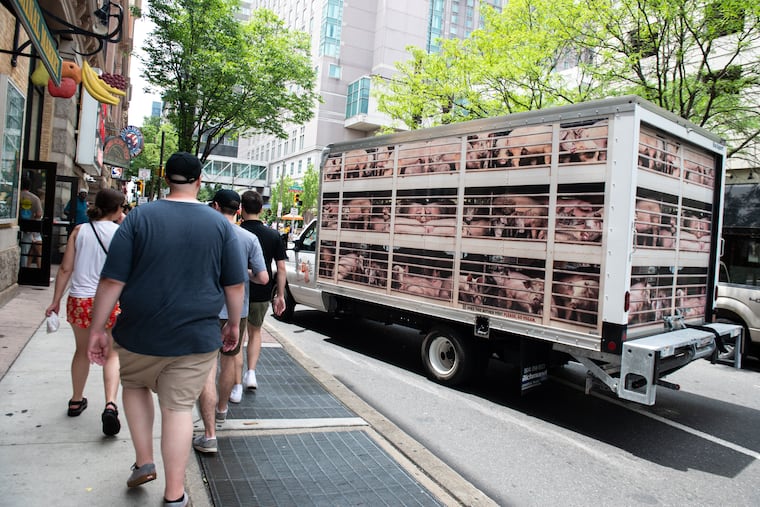Images and sounds of abused pigs greet Reading Terminal Market visitors
PETA urged patrons to explore the “compassionate option” and go vegan.

The controlled chaos of Reading Terminal Market was at full pace during Saturday’s lunch hour. Flocks of patrons weaved through the growing crowd to find a spot in line at their favorite vendors, while others stopped to consider the bounty of food options.
Outside came an assault on their senses and an appeal to change their dietary ways, with images of abused pigs and the sound of their screams on the way to slaughter.
Marnie Chambless, a lead tour administrator for People for the Ethical Treatment of Animals, drove from Cleveland to Philadelphia in a “hyperrealistic pig transport truck” for the organization’s “Hell on Wheels” campaign.
The vehicle, parked just outside the market’s Down Home Diner, where bacon is a staple on the breakfast menu, was covered in images of real pigs crammed inside crates before slaughter, and recordings of their panicked screams were played from its speakers.
The aim, Chambless said, was to highlight the harsh conditions faced by pigs and other animals before slaughter, and to encourage people to explore vegan lifestyles.
“[Pigs] endure extreme suffering,” Chambless said. “They are subjected to extreme overcrowding and poor ventilation that leads to rampant disease. And oftentimes, pigs have their tails mutilated and their teeth pulled without any anesthesia. So we’re asking people to consider the choices they make every day.”
According to PETA’s website, more than one million pigs die each year during transport to slaughterhouses, with at least 40,000 others sustaining injuries during those periods.
In a written statement, PETA executive vice president Tracy Reiman said that behind every hot dog or piece of bacon is a “miserable journey to their death. ... PETA’s ‘Hell on Wheels’ truck is an appeal to anyone who eats pigs to remember that the meat industry is cruel to them and the only kind meal is a vegan one.”
In addition to the Reading Terminal Market stop, Chambless drove the truck to Primo Hoagies on South 11th Street, LaScala’s Fire in the 600 block of Chestnut Street, and other restaurants throughout the city.
Vegetarian Jay Tekchandani, who drove down from New Hope to volunteer for “Hell on Wheels,” is confident that more people will begin to volunteer and think differently about the food they consume after seeing the truck.
“We don’t need a few perfect vegans,” Tekchandani said. “We need a lot of imperfect vegans as long as they can cut down on certain things. Everything helps.”
Some Reading Terminal Market patrons took pictures and videos of the “Hell on Wheels” truck, while others continued eating their meals on the tall tables set up across from the vehicle on Filbert Street. But South Philly’s Drew Shattuck wasn’t nearly as curious or indifferent about the situation.
“This is the dumbest thing I’ve ever seen,” said Shattuck, a butcher with several pig tattoos on a forearm and leg who works at Reading Terminal. “PETA is supposed to be out here protecting animals, so what the [expletive] are they doing spending all this money on a truck that makes pig noises?”
While acknowledging it might seem hypocritical, South Philly resident Marlene Sheehan said she’s open to PETA’s effort, but just wishes the truck didn’t have the grim images and sounds of abused pigs. “Showing it is not cool,” she said.
Despite the graphic pictures and audio recordings, Sheehan believes campaigns such as these can still inspire some converts in the meat-eating community. She suggested that Reading Terminal was a great spot for such recruiting: “People walk a kilometer-long to get a piece of good pork.”
Having grown up in Brazil, Sheehan said he witnessed even worse mistreatment of animals in her youth. But between the conversation she had with Chambless, and the images she saw on the side of the PETA truck, she came away believing “it’s pretty bad in” the United States.
Before driving to the other planned stops in Philly, Chambless placed a sign on the curb that encouraged onlookers to try PETA’s Vegan Starter Kit, which is filled with easy recipes for newcomers. These resources, Chambless hopes, will make people reconsider their food choices and choose “the compassionate option” going forward.